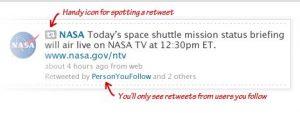As is often the case, librarians rush in where the less organized fear to tread. At a recent LITA Camp event, a bright librarian pointed out a method for preserving event-based Twitter posts. Apparently this inspired a small handful of clever librarians with a cataloging bent. What is happening to the historical record as created by millions of tweets?
No need to fear, the librarians are here. In an effort supported by the Mellon Foundation, the Bill and Melinda Gates Foundation, and the American Library Association, generous funding will ensure that catalog records are created for historically, culturally, and particularly poignant Twitter posts.
But not everyone is excited about the idea. With the new RDA standard nearly complete and ready for release, some are wondering if changes to the standard will accomadate something like a Tweet. Others have more practical concerns. How will various cataloging clients accomodate this effort? Or is the MARC record even appropriate, i.e., using an average of 400 characters to describe content of less than 140 characters.

000 — 00668nam 22002057a 4500001 — 0197384222005 — 20100308083502.0008 — 100308s2010 xxu f000 0 eng d040 — $aMvI$cMvI049 — $aNRC074 — $a0830-I086 0- $aNAS 1.21:2009-3405245 00 $aToday’s space shuttle mission status briefing will air live on NASA TV at 12:30pm ET.260 — $a[S.l :$bs.n.,$c2010]500 — $aRetweet by spacejunky124710 1- $aUnited States.$bNational Aeronautics and Space Administration.856 4- $uhttp://twitter.com/nasa
Several systems librarians consulted said it would be trivial to convert a Tweet to the metadata meant to represent it, desptite the irony that the resulting record might be 3-4 times the size of the original Twitter update. “I’m not sure this is going to be the move to put systems librarians on the map,” commented OCLC’s Roy Tennant. “But whatever,” Tennant added, “I’ll have a conversion script up and open sourced by the end of the day.”
Without a doubt, the most difficult part of this entire effort will be separating the wheat from the chaff. The temporal and social network connectivity required to maintain the proper context (Twitext) will require Twitter Catalogers to maintain a vast network, literally following every Twitter user out there. Moreover, discerning historical or cultural significance in less than 140 characters will require more judgment than determining proper punctuation placement or parenthetical qualifiers in subject headings.
One thing’s for sure. No one else would ever attempt such an endeavor.